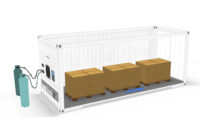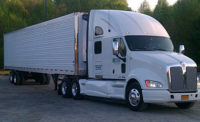foodcareplus, Belgium, announced a fully integrated reefer consolidation service (less than container load service) for seafood products leaving Canada for Europe.
When the Comprehensive Economic and Trade Agreement (CETA) comes into force, almost 96% of EU tariffs for fish and seafood products will be duty-free. These products include frozen shrimp, lobster, scallops and mackerel. It is expected that the trade agreement will be ratified by the European Council and the Canadian parliament in 2015, coming into effect no earlier than 2016.
The new integrated reefer consolidation service from Halifax will allow the seafood community to ship deep-frozen product from Canada straight into the heart of Europe via its frozen cargo facility in the port of Antwerp. At the same location, physical quality inspection and veterinary examination will be performed by the Food Agency for the Safety of the Food Chain before the cargo is prepared for swift delivery to the final customer.
The service comes with two options—delivered.easy, which is said to be the easiest and most straightforward service, including collection of palletized cargo in Halifax, ocean freight into the cargo facility in Antwerp, full release with the food safety authorities, customs clearance and delivery. Initially, the service will cover Belgium, the Netherlands, Luxemburg, Germany, Austria, France, Italy, Ireland and the United Kingdom whereas other countries will be added as from September—and pickup.easy, whichallows any European importer to pick up the cargo at the facility in Antwerp where they may choose to opt in on customs clearance.
The new service comes with an easy-to-use online application for all-in pricing that leaves no surprises. Foodcareplus aims for deliveries within 72 hours after arrival in Europe. The Halifax operation will pre-inspect all paperwork and documentation before the cargo is shipped into the Antwerp facility. The first shipment of the weekly service with a short transit time of approximately 10 days is organized to leave Canada mid-June arriving in Europe no later than beginning of July.



